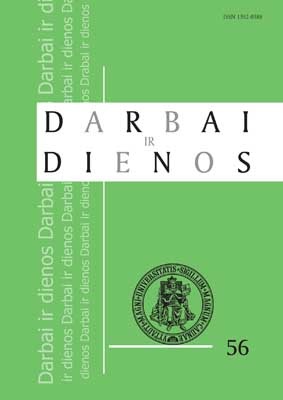Praha – Aušra
Praha – Aušra
Author(s): Algirdas GrigaravičiusSubject(s): Cultural Essay, Political Essay, Societal Essay
Published by: Vytauto Didžiojo Universitetas
Keywords: Praha; Aušra
Summary/Abstract: Rašyti šį tekstą, pavadintą „Praha – „Aušra“*, paskatino 2009 m. išleistas Gabrielos Eleonoros Mol-Basanavičienės (1861–1889) dienoraštis ir laiškai, parengti Vaido Šeferio. Įspūdinga meilės istorija, ne tokios įtampos kaip kanoninė karališkosios poros Barboros Radvilaitės ir Žygimanto Augusto, tačiau savaip supinta su Lietuvos perspektyva ir likimu XX amžiuje. Jono Basanavičiaus biografijai reikšminga detalė jos 1884 m. kovo 20 d. laiške esantis sakinys: „Bet jeigu turėtum daugiau naudos keliaudamas į Peterburgą ir jeigu tai būtų būtina“. Matyt, buvo svarstymų atsisakyti Bulgarijos, po studijų Maskvoje pasirinktos dėl sveikatos ir Varšuvos švietimo apygardai nepratęsus stipendijos bei paklausius buvusių bendramokslių bulgarų, gavusių geras vietas besikuriančioje valstybėje. Į pirmąjį pasimatymą Ellė laiškeliu pakviečia per savo gimtadienį 1883 m. gruodžio 7 d., o kitų metų balandžio 15 d. jie atlieka civilinės metrikacijos formalumus Vienoje. The first newspaper of the Lithuanian national revival movement, Aušra (Dawn), came into existence after an unsuccessful attempt to establish a Lithuanian Scholarly Society. It was important to Lithuanian activists, particularly Jonas Basanavičius, that this newspaper be legally available in Lithuania. The coronation of Alexander III in Moscow led to attempts to have Aušra legalized, something encouraged by both pro-Czarist illusions and a belief in Russian predilections for a peasant nation. Seeking to exploit Russia‘s quest at eliminating Polish influence, Lithuanian activists emphasized the danger of Lithuanians becoming Polonized. This opened the door to an undesirable confrontation and marked a change in the relations between the Lithuanian and the Polish national movements, with tensions raised by the Polish insistence, in their press, of regarding the Lithuanians as their “younger brothers.” Jonas Šliūpas, in his answer to the editor of Poznan‘s Polish newspaper, aimed at reaching a compromise, whereas Basanavičius took the position of feeling hurt and wronged. If the latter objected strenuously to Poles calling Lithuanians just a people but not a nation, Šliūpas in his article “Genuinely searching for nationhood” (Aušra, 1884, Nr. 1–3, p. 1–10) argued that the newspaper‘s primary goal was to “make” Lithuanians into a nation. Before a characteristically Lithuanian way had been decisively agreed upon, the divergence in the camp of the Aušrininkai could only be btween the Polonophile and Russophile tendencies. The young Lithuanian activists, especially Šliūpas (the memorandum that he submitted to Warsaw‘s governor-general Iosif Gurka brough an end to efforts at legalizing Aušra) may be considered as pioneers of a not-very-successful but naively pragmatic Lithuanian politics of national re-awakening.
Journal: Darbai ir dienos
- Issue Year: 2011
- Issue No: 56
- Page Range: 153-180
- Page Count: 28
- Language: Lithuanian

